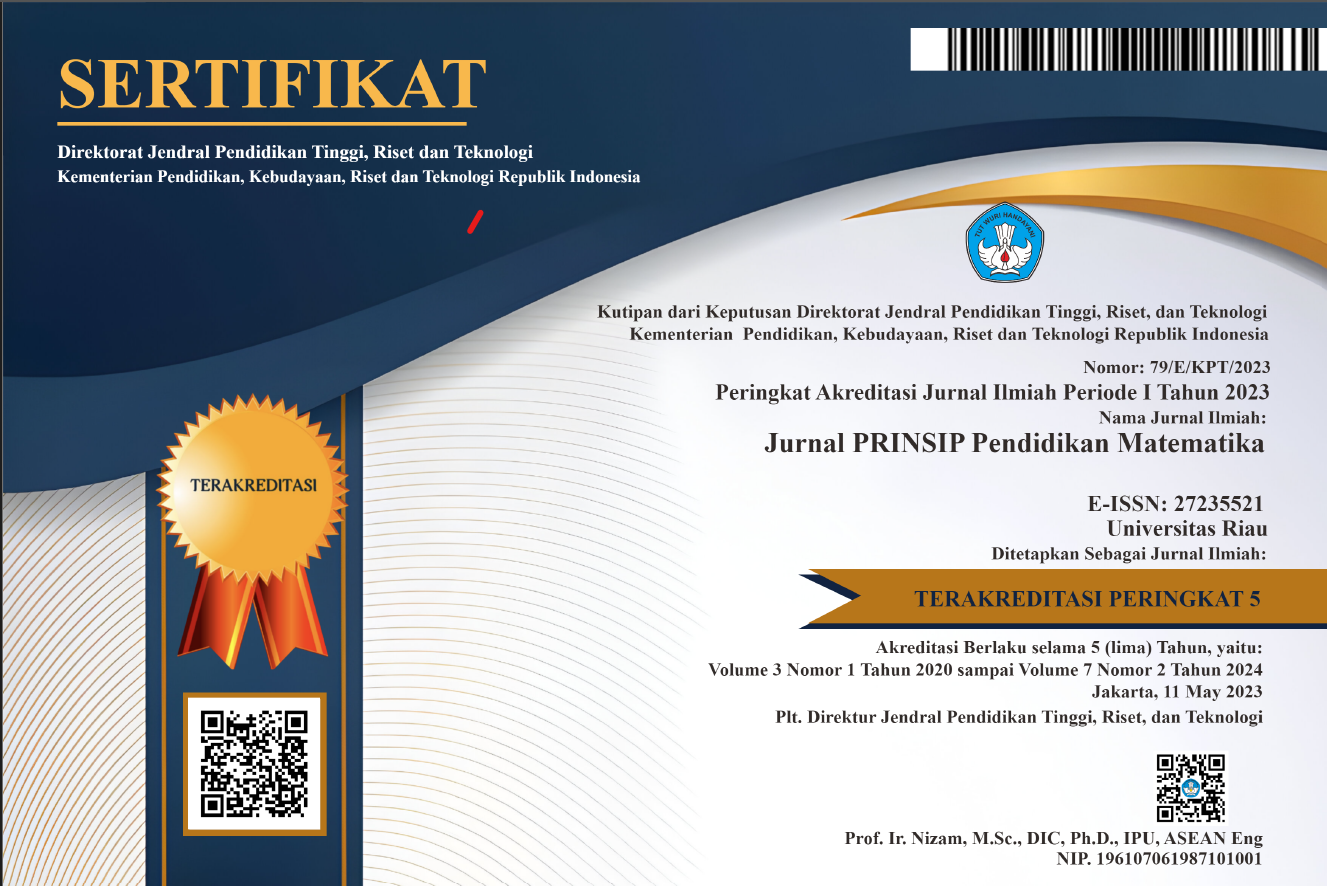DEVELOPMENT OF MATHEMATICAL LEARNING TOOLS BASED ON PROBLEM-BASED LEARNING (PBL) MODELS OF SINE AND COSINE RULES TO FACILITATE MATHEMATICAL PROBLEM-SOLVING ABILITY STUDENTS OF CLASS X SMA/MA
Abstract
This study aims to produce a mathematical learning device based on the Problem-Based Learning (PBL) model of the sine and cosine rules to facilitate mathematical problem-solving skills (KPMM) for class X SMA/MA students that meet the valid criteria for syllabus, lesson plans, worksheets and practical for student worksheets. The development model used by the researcher is a 4-D model (four-D. The 4-D model consists of 4 stages, namely the definition stage, the design stage, the development stage, and the dissemination stage). Based on the data from the validation results, the learning tools developed in the form of syllabus, lesson plans and mathematics worksheets use the Problem Based Learning model on the sine and cosine rule material to facilitate the mathematical problem-solving abilities of class X SMA / MA students meet the very valid category and very practical category. From the results of this study it can be concluded that the syllabus, lesson plans, and worksheets are feasible to use.
Downloads
References
Andesma, T., & Anggraini, R. D. (2019). Penerapan Model Problem Based Learning (PBL) untuk Meningkatkan Kemampuan Pemecahan Masalah Matematis (KPMM) Siswa Kelas X TKR 1 SMK Muhammadiyah 1 Pekanbaru. Jurnal Prinsip Pendidikan Matematika, 2(1), 12–18.
Kawiyah, S. (2015). Pengembangan Perangkat Pembelajaran Matematika Berbasis Saintifik untuk Meningkatkan Kemampuan Pemecahan Masalah dan Prestasi Belajar Siswa. PYTHAGORAS: Jurnal Pendidikan Matematika, 10(2), 201–210. https://doi.org/10.21831/pg.v10i2.9163
Masitah, M. (2018). Pengembangan Perangkat Pembelajaran untuk Memfasilitasi Guru Menumbuhkan Rasa Tanggung Jawab Siswa SD terhdap Masalah Banjir. Proceeding Biology Education Conference, 15(1), 40–44.
Meisura, A., Risnawati, & Amir MZ, Z. (2019). Pengaruh Penerapan Strategi Metakognitif Terhadap Kemampuan Pemecahan Masalah Matematis Berdasarkan Kemandirian Belajar siswa. ANARGYA: Jurnal Ilmiah Pendidikan Matematika, 2(1), 13–20.
Nazarullah. (2016). Peningkatan Kemampuan Representasi Matematis Siswa dengan menggunakan Pendekatan Pembelajaran Open-Ended pada kelas VII SMP Negeri 1 Bandar Baru. UIN Ar-Raniry Banda Aceh.
Noviantii, E., Yuanita, P., & Maimunah, M. (2020). Pembelajaran Berbasis Masalah dalam Meningkatkan Kemampuan Pemecahan Masalah Matematika. Journal of Education and Learning Mathematics Research (JELMaR), 1(1), 65–73. https://doi.org/https://doi.org/10.37303/jelmar.v1i1.12
Nuraini, N., Maimunah, M., & Roza, Y. (2020). Perangkat Pembelajaran Model Problem Based Learning Memfasilitasi Kemampouan Pemecahan Masalah Matematis pada Materi Aritmatika Sosial. AKSIOMA: Jurnal Program Studi Pendidikan Matematika, 9(3), 799–808. https://doi.org/10.24127/ajpm.v9i3.2957
Purnomo, P., & Palupi, M. S. (2016). Pengembangan Tes Hasil Belajar Siswa Matematika materi Menyelesaikan Masalah yang berakaitan dengan Waktu, Jarak dan Kecepatan untuk Siswa Kelas V. Jurnal Penelitian, 20(2), 151–157.
Siregar, H. M., & Siregar, S. N. (2021). Profil Self Regulation Mahasiswa Pendidikan Matematika FKIP Universitas Riau di Masa Pandemi Covid-19. ANARGYA: Jurnal Ilmiah Pendidikan Matematika, 4(1), 1–10. https://doi.org/10.24176/anargya.v4i1.5601
Siregar, H. M., Solfitri, T., & Anggraini, R. D. (2022). Analisis Kebutuhan Modul Kalkulus Integral Untuk Meningkatkan Kemampuan Berpikir Kreatif Matematis. GAUSS: Jurnal Pendidikan Matematika, 5(1), 16–26. https://doi.org/http://dx.doi.org/10.30656/gauss.v5i1.4718
Siregar, H. M., Solfitri, T., & Siregar, S. N. (2021). The Relationship between Perceptions of Online Learning and Self-Regulation of Mathematics Education Students. Jurnal Didaktik Matematika, 8(2), 208–221. https://doi.org/10.24815/jdm.v8i2.21882
Siregar, H. M., Solfitri, T., & Siregar, S. N. (2022). Development of E-Worksheet of Integration Technique Rational Functions Different Linear Factors to Improve Mathematical Creative Thinking Skills. 2021 Universitas Riau International Conference on Education Technology (URICET-2021), 35–40. https://ices.prosiding.unri.ac.id/index.php/ICES/article/view/7975
Siregar, H. M., Solfitri, T., Siregar, S. N., Anggraini, R. D., & Aldresti, F. (2022). Analisis Kebutuhan E-LKM Kalkulus Integral Untuk Meningkatkan Kemampuan Berpikir Kreatif Matematis. RANGE: Jurnal Pendidikan Matematika, 4(1), 55–70. https://doi.org/https://doi.org/10.32938/jpm.v4i1.2664
Son, A. L., Sudirman, S., & Widodo, S. A. (2020). Asosiasi Kemampuan Koneksi dan Pemecahan Masalah Matematika: Cross-Sectional di Timor Barat. AKSIOMA: Jurnal Program Studi Pendidikan Matematika, 9(2), 326–337. https://doi.org/10.24127/ajpm.v9i2.2742
Sugiyono. (2015). Metode Penelitian Pendidikan Pendekatan Kuantitatif, Kualitatif, dan R&D. Alfabeta.
Yustianingsih, R., Syarifuddin, H., & Yerizon, Y. (2017). Pengembangan Perangkat Pembelajaran Matematika Berbasis Problem Based Learning (PBL) untuk Meningkatkan Kemampuan Pemecahan Masalah Peserta Didik Kelas VIII. JNPM (Jurnal Nasional Pendidikan Matematika), 1(2), 258–274. https://doi.org/10.33603/jnpm.v1i2.563
Copyright (c) 2022 Jurnal Prinsip Pendidikan Matematika

This work is licensed under a Creative Commons Attribution-NonCommercial-ShareAlike 4.0 International License.





